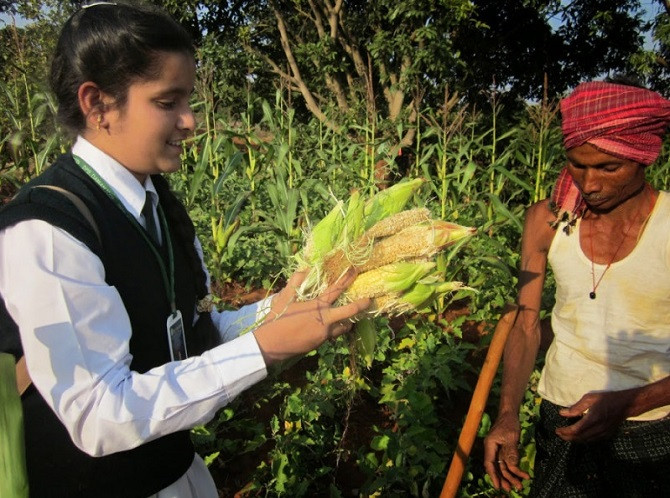The 15-year-old has an initiative to clean water with corn cobs
Schoolgirl Lalita Prasida (India) was 15 years old to find the effect from corn cobs.
Ideas from these

She often saw piles of corn cobs lying in the sun without anyone looking forward.
15-year-old girl Lalita Prasida realized that, in many parts of the world, drinking water is something extremely luxurious. 'In my studies, I found a lot of dirty water around, even more clean water' - she said - 'While drinking water is very difficult to exploit now'. Lalita wanted to change this, so she thought of a new way to filter water.
During long journeys across India, Lalita enjoys exploring different cultures between regions and villages. During her journey, she often sees piles of corn cobs lying in the sun that no one is interested in.
Lalita wonders what can be done with them? She realized that farmers would separate corn grains to sell and dispose of unused corn, causing environmental pollution because biological waste does not decompose for a long time. Even pets don't eat these things.
Water filtration capacity
This female student started her mission right after the conversation with the local farmers.'When I talked to a farmer in the tribe' - she wrote in the project description - 'I knew about the low applicability of corn cobs, urging me to take advantage of agricultural waste. this' .
In school, Lalita is taught about biological waste (fruit peel, eggshell, shrimp shell) that can be used to remove contaminants in water. Lalita started from experiments with corn cobs in the kitchen. She picked up the corncobs that were thrown on the road and put them in the bowl of dirty water in the kitchen. When the girl returned to check, the water seemed much cleaner.

Lalita's invention used corn cobs like a sponge to absorb dirt from the kitchen pipe.
She said that corn cobs - with a porous structure and high durability, can act as activated carbon in water filters - is the perfect biological waste for their village.
Lalita began studying more seriously, collecting corn cobs from local farmers, rinsing with water and drying them in the sun. At the same time, she designed a water filtration system that uses corn in four ways - cutting, chopping, pulverizing and burning into coal - (mixed with sand) to filter waste water through steps.
Lalita's invention uses corn cobs like a sponge to absorb dirt from kitchen pipes and naturally contaminated ponds and lakes.
Currently, that 'weird' machine of Lalita operates according to the mechanism: A thin metal rod with five spokes far away from the foot. Attached to the end of each nan is a plastic bottle cut backwards. The straw extends from bottle to bottle.
Lalita brought her invention to the school lab and checked it again. This time she also did some water tests before and after filtering. She realized her system removed 70-80% of dirt, including salt oxide, detergent, oil, dyes and other flotation substances.
While the physical components of dirt are not good for human health, the biggest problem that dirty water causes is that pathogenic microorganisms can thrive in it. Lalita believes that, to disinfect water, people can boil water or add iodine.
Intensive physical and chemical experiments are needed before she can bring them to the farmers. She hopes that this tool is an effective solution to clean up the water and industrial waste around them.
So far, feedback has been quite positive.'They were surprised when this could happen' - Lalita said about the feeling of farmers who gave her corn cobs.
In the future, Lalita hopes this system can clean up ponds in her village and elsewhere.'Ponds are the main source of clean water for people, but fertilizers and pesticides are mixed in there'. She wanted to create a system where corn cobs were attached to bamboo poles that were submerged in ponds, then pollutants would remain in the holes of corn kernels.

Lalita's invention won Google's 'Positive impact on the community' worth $ 10,000 and 1 year of scholarship from Scientific American magazine.
- Radiation reduction with corn cobs
- Turn corn cobs into fuel
- Drinking corn water, you must know this
- Clean water and numbers to speak
- Technology turns dirty water into clean water in Israel
- Experience in growing sweet corn
- Admire the exotic polychrome corn in America
- The new invention using graphene creates clean water from polluted seawater in a simple step
- Terrifying images of the situation of depleting clean water all over the world
- The way to make corn is like a rainbow
- Every year 1.8 million children die from lack of clean water
- Using corn residues ... corn fuel!
 Daily use inventions come from universities
Daily use inventions come from universities Special weight loss device helps prevent appetite
Special weight loss device helps prevent appetite 8 inventors were killed by their own inventions
8 inventors were killed by their own inventions Iran invented a motor car powered by water
Iran invented a motor car powered by water